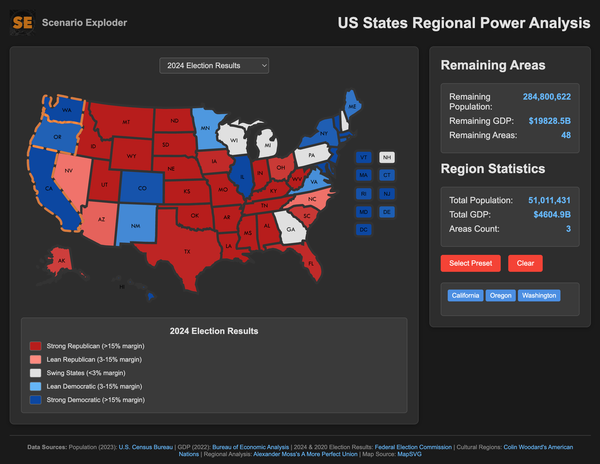Soft Secession

In my book, Defederalized, I used a variety of words to describe the transition of power away from the federal government to the states. I specifically avoided the word secession due to its fraught historical connotations. It's also a bit of a misnomer—secession implies outright breaking away. The technical term that's most accurate is devolution, but that's arguably worse given how most people interpret that word.
With that in mind, I highly recommend checking out this article on "soft secession" by Chris Armitage. What's notable for me about this article is far along state Attorney Generals and Governors already are in these discussions.
Here's the quote that really sums it up:
We're not heading toward another Fort Sumter. We're watching something else: states quietly walking away from each other. Blue states will protect abortion rights, support organized labor, and protect individual rights. Red states will allow Christian theocracy, suppress wages, criminalize free speech, and destroy healthcare. The federal government becomes a hollow structure that states have a moral imperative to ignore.
There are some really great points about the economic side of things as well.
At some point between now and the 2028 election, someone on the (D) side of things will figure out a way to win elections by running against the federal government. Once that starts, there won't be many left to defend or argue for centralization. At some point after that, most likely after the states have largely gone their own way, we'll likely see something like the Statute of Westminster formalizing things.
The alternative? Someone would have to argue for reconstituting all of the (rapidly disintegrating) federal agencies, reforming those that were funded, and somehow convincing everyone that this time, after all of that, things will be different.
Imagine ten presidential contenders in an early primary debate. Nine of them argue for rebuilding federal power—a return to the way things were before. In contrast, one of them argues for turning over Medicare, Medicaid, and Social Security to the states—revenue collection, administration, program details, all of it. That one candidate packages that as part of an overall reform program: by moving programs from the federal government to the states, it also provides an opportunity for realignment away from regulatory capture and all the rest.
Which of those candidates do you think would win the primary? Who would win the general?
The next few years are going to be very interesting.
Oh, before you go, you might want to check out a book I finished recently - The Prize, by Daniel Yergin. If you want to understand the geopolitics of the 20th century, oil is key—and this is the definitive history.




